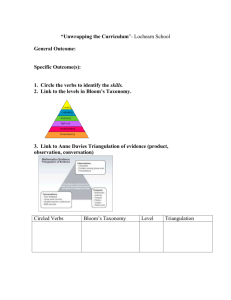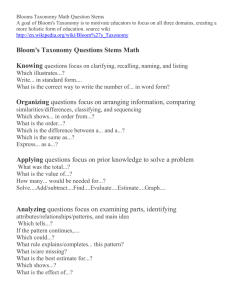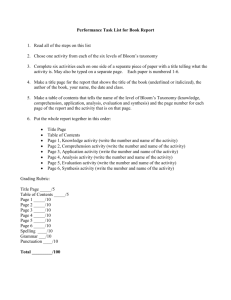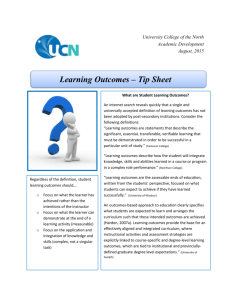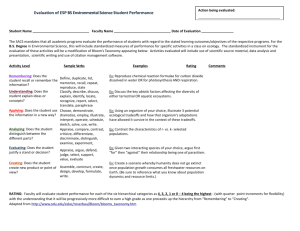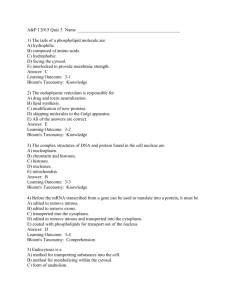Blooms Taxonomy
advertisement
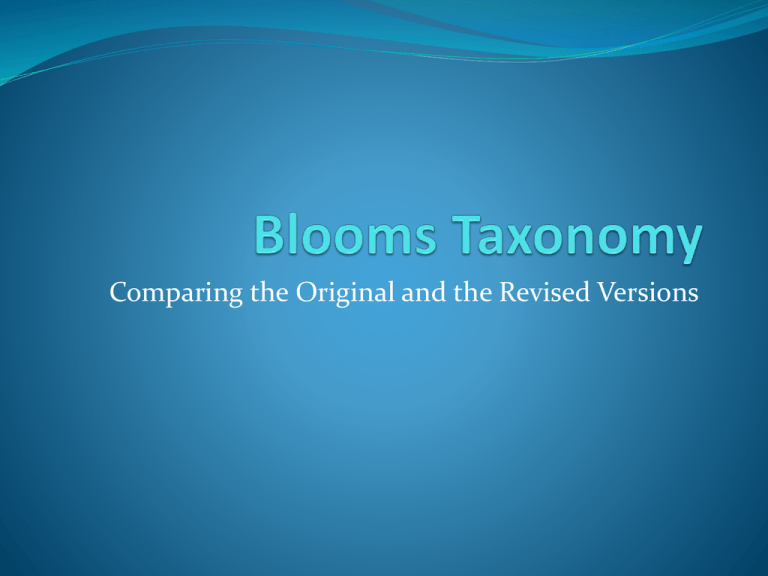
Comparing the Original and the Revised Versions Benjamin Bloom (1956) developed a classification of levels of intellectual behavior in learning. This taxonomy contained three overlapping domains: the cognitive =intellectual psychomotor =physical skills (movement) affective =emotional Within the cognitive domain, he identified six levels: Knowledge Comprehension Application Analysis Synthesis Evaluation These domains and levels are still useful today as you develop the critical thinking skills of your students. Visual Representation of Bloom’s Taxonomy http://ww2.odu.edu/educ/roverbau/Bloom/blooms_taxonomy.htm During the 1990's a new group of cognitive psychologists, lead by Bloom’s former student, Lorin Anderson, updated the taxonomy using similarly termed levels: Remembering Understanding Applying Analyzing Evaluating Creating Visual Representation of the Revised Taxonomy http://ww2.odu.edu/educ/roverbau/Bloom/blooms_taxonomy.htm Comparing the Original vs. Revised Bloom’s Original Revised Note the change from nouns to verbs associated with each level. Defining the Terms Knowledge Remembering The learner must recall information (i.e. bring to mind the appropriate material). Comprehension Understanding The learner can put information into her/his own words, translating and interpreting it. Application Applying The learner uses abstractions (e.g. ideas) in particular and concrete situations. Defining the Terms Analysis Analyzing: The learner can break down a communication into its constituent elements or parts. Synthesis Evaluating: The learner makes judgments about the value of material or methods for a given purpose. Evaluation Creating: The learner puts together elements or parts to form a whole. How this is expressed in the classroom: Representative words and questions to ask Remembering Representative Words: Define, recall, select, label, recite, point out, list, record, reproduce, name, repeat, memorize Sample Questions: What happened after...? How many...? Who was it that...? Can you name the...? Describe what happened at...? Who spoke to...? Can you tell why...? Find the meaning of...? How this is expressed in the classroom: Representative words and questions to ask Understanding Representative Words: Describe, outline, translate, discuss, recognize, match, explain, restate, tell, identify, select, summarize, indicate, continue Sample Questions: What do you think could have happened next...? Can you provide an example of what you mean...? What was the main idea...? Who was the key character...? What differences exist between...? How this is expressed in the classroom: Representative words and questions to ask Applying Representative Words: Apply, use, identify, demonstrate, construct, illustrate, show how, explain, interpret, employ, select, dramatize Sample Questions: Do you know another instance where...? Could this have happened in...? Can you group by characteristics such as...? What factors would you change if...? Can you apply the method used to some experience of your own...? How this is expressed in the classroom: Representative words and questions to ask Analyzing Representative Words: Analyze, distinguish, examine, compare/contrast, investigate, categorize, identify, explain, separate, advertise Sample Questions: Which events could have happened...? If ... happened, what might the ending have been? How was this similar to...? What was the underlying theme of...? What do you see as other possible outcomes? Why did ... changes occur? Can you explain what must have happened when...? How this is expressed in the classroom: Representative words and questions to ask Evaluating Representative Words: Judge, select, choose, decide, debate, verify, recommend, assess, rate, determine Sample Questions: Is there a better solution to...? Judge the value of... Can you defend your position about...? Do you think ... is a good or a bad thing? How would you have handled...? Do you believe…? How this is expressed in the classroom: Representative words and questions to ask Creating Representative Words: Create, invent, compose, predict, plan, construct, design, imagine, propose, devise Sample Questions: Can you design a ... to ...? Can you see a possible solution to...? If you had access to all resources how would you deal with...? Why don't you devise your own way to deal with...? How many ways can you...? Why not compose a song about...? http://www.schrockguide.net/bloomin-apps.html References Pyramid Images retrieved from: http://ww2.odu.edu/educ/roverbau/Bloom/blooms_taxonomy.htm Terminology definitions retrieved from: http://xnet.rrc.mb.ca/glenh/newpage83.htm Representative words retrieved from: http://wwild.coe.uga.edu/pptgames/resources/bloom_questions.pdf Sample questions retrieved from: http://iss.schoolwires.com/cms/lib4/NC01000579/Centricity/Domain/ 1366/BloomQuestions_000.pdf Cog and Wheel image retrieved from: http://www.schrockguide.net/bloomin-apps.html
